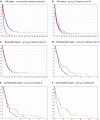Associations between ABO blood groups and pancreatic ductal adenocarcinoma: influence on resection status and survival
- PMID: 28556564
- PMCID: PMC5504338
- DOI: 10.1002/cam4.1097
Associations between ABO blood groups and pancreatic ductal adenocarcinoma: influence on resection status and survival
Abstract
Both serology-based and genetic studies have reported an association between pancreatic cancer risk and ABO blood groups. We have investigated this relationship in a cohort of pancreatic cancer patients from Western Norway (n = 237) and two control materials (healthy blood donors, n = 379; unselected hospitalized patients, n = 6149). When comparing patient and blood donor ABO allele frequencies, we found only the A1 allele to be associated with significantly higher risk for pancreatic ductal adenocarcinoma (PDAC) (23.8% vs. 17.9%; OR = 1.43, P = 0.018). Analyzing phenotypes, blood group A was more frequent among PDAC cases than blood donors (50.8% vs. 40.6%; OR = 1.51, P = 0.021), an enrichment fully explained by the A1 subgroup. Blood group O frequency was lower in cases than in blood donors (33.8% vs. 42.7%; OR = 0.69, P = 0.039). This lower frequency was confirmed when cases were compared to hospitalized patients (33.8% vs. 42.9%; OR = 0.68, P = 0.012). Results for blood group B varied according to which control cohort was used for comparison. When patients were classified according to surgical treatment, the enrichment of blood group A was most prominent among unresected cases (54.0%), who also had the lowest prevalence of O (28.7%). There was a statistically significant better survival (P = 0.04) for blood group O cases than non-O cases among unresected but not among resected patients. Secretor status did not show an association with PDAC or survival. Our study demonstrates that pancreatic cancer risk is influenced by ABO status, in particular blood groups O and A1 , and that this association may reflect also in tumor resectability and survival.
Keywords: ABO; FUT2; blood group; glycosyltransferase; pancreatic ductal adenocarcinoma; risk factor.
© 2017 The Authors. Cancer Medicine published by John Wiley & Sons Ltd.
Figures

Similar articles
-
ABO blood type, smoking status, other risk factors and prognosis of pancreatic ductal adenocarcinoma.Medicine (Baltimore). 2020 Apr;99(14):e19413. doi: 10.1097/MD.0000000000019413. Medicine (Baltimore). 2020. PMID: 32243360 Free PMC article.
-
Variant ABO blood group alleles, secretor status, and risk of pancreatic cancer: results from the pancreatic cancer cohort consortium.Cancer Epidemiol Biomarkers Prev. 2010 Dec;19(12):3140-9. doi: 10.1158/1055-9965.EPI-10-0751. Epub 2010 Oct 22. Cancer Epidemiol Biomarkers Prev. 2010. PMID: 20971884 Free PMC article.
-
Relationship between ABO Blood Group Alleles and Pancreatic Cancer Is Modulated by Secretor (FUT2) Genotype, but Not Lewis Antigen (FUT3) Genotype.Cancer Epidemiol Biomarkers Prev. 2023 Sep 1;32(9):1242-1248. doi: 10.1158/1055-9965.EPI-23-0009. Cancer Epidemiol Biomarkers Prev. 2023. PMID: 37342060 Free PMC article.
-
ABO blood group and risk of pancreatic cancer: a study in Shanghai and meta-analysis.Am J Epidemiol. 2013 Jun 15;177(12):1326-37. doi: 10.1093/aje/kws458. Epub 2013 May 6. Am J Epidemiol. 2013. PMID: 23652164 Free PMC article.
-
A review of lifestyle, metabolic risk factors, and blood-based biomarkers for early diagnosis of pancreatic ductal adenocarcinoma.J Gastroenterol Hepatol. 2019 Feb;34(2):330-345. doi: 10.1111/jgh.14576. Epub 2019 Jan 17. J Gastroenterol Hepatol. 2019. PMID: 30550622 Free PMC article. Review.
Cited by
-
ABO Blood Type and the Long-term Outcomes of Pancreatic Cancer.Intern Med. 2020;59(6):761-768. doi: 10.2169/internalmedicine.3748-19. Epub 2020 Mar 15. Intern Med. 2020. PMID: 32173688 Free PMC article.
-
Prognostic value of ABO blood groups in upfront operated pancreatic ductal adenocarcinomas.Langenbecks Arch Surg. 2024 Sep 18;409(1):282. doi: 10.1007/s00423-024-03469-8. Langenbecks Arch Surg. 2024. PMID: 39320512 Free PMC article.
-
The mucinous domain of pancreatic carboxyl-ester lipase (CEL) contains core 1/core 2 O-glycans that can be modified by ABO blood group determinants.J Biol Chem. 2018 Dec 14;293(50):19476-19491. doi: 10.1074/jbc.RA118.001934. Epub 2018 Oct 12. J Biol Chem. 2018. PMID: 30315106 Free PMC article.
-
Erythroprotective Potential of Phycobiliproteins Extracted from Porphyridium cruentum.Metabolites. 2023 Mar 1;13(3):366. doi: 10.3390/metabo13030366. Metabolites. 2023. PMID: 36984806 Free PMC article.
-
Modifiable and Non-Modifiable Risk Factors for the Development of Non-Hereditary Pancreatic Cancer.Medicina (Kaunas). 2022 Jul 22;58(8):978. doi: 10.3390/medicina58080978. Medicina (Kaunas). 2022. PMID: 35893093 Free PMC article. Review.
References
-
- Available at: http://www.cancerresearchuk.org/about-cancer/type/pancreatic-cancer/ (accessed 12 April 2017).
-
- Raimondi, S. , Lowenfels A. B., Morselli‐Labate A. M., Maisonneuve P., and Pezzilli R.. 2010. Pancreatic cancer in chronic pancreatitis; aetiology, incidence, and early detection. Best Practice Res. Clin. Gastroenterol. 24:349–358. - PubMed
-
- Schulte, A. , Pandeya N., Fawcett J., Fritschi L., Risch H. A., Webb P. M., et al. 2015. Association between Helicobacter pylori and pancreatic cancer risk: a meta‐analysis. Cancer Causes Control 26:1027–1035. - PubMed
MeSH terms
Substances
LinkOut - more resources
Full Text Sources
Other Literature Sources
Medical

